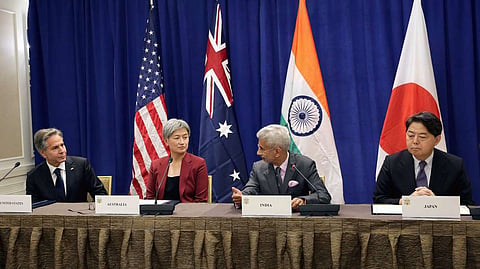
- Home
- Live Blog
- Breaking News
- Top Headlines
- Cities
- NE News
- Sentinel Media
- Sports
- Education
- Jobs

New York: Warning against terrorists deploying new technologies, the Quad foreign ministers have reinforced their call for concerted international action against Pakistan-based Lashkar-e-Tayyiba (LeT), Jaish-e-Mohammad (JeM), as well as Al-Qa’ida and the Islamic State outfit.
After their meeting in Tokyo, the Quad ministers said in a joint statement on Monday that they were committed to working with international and regional partners to forestall “threats posed by the use of new and emerging technologies for terrorist purposes”.
“We reiterate the call for concerted action against all UN-listed terrorist groups including Al-Qa’ida, ISIS/Daesh, Lashkar-e-Tayyiba (LeT), Jaish-e-Mohammad (JeM), and their proxy groups,” External Affairs Minister S. Jaishankar, US Secretary of State Antony Blinken, and Foreign Ministers Penny Wong of Australia and Yoko Kamikawa of Japan said in their statement.
“We deplore the use of unmanned aerial vehicles (UAVs), drones, tunnels, and information and communication technologies by terrorists and terrorist entities,” they said.
Recalling the 26/11 Mumbai and the 2016 Pathankot terrorist attacks, they called for “bringing the perpetrators of these attacks to justice without delay”.
The ministers said the first meeting of the Quad Working Group on Counter-Terrorism established at the ministerial meeting in New Delhi last year had “fruitful discussions” at its first meeting and at the fourth tabletop exercise in Honolulu in December, and added that they looked forward to next exercise to be hosted by Japan in November.
The tabletop exercises look at scenarios to develop responses to an overwhelming terrorist incident in the Indo-Pacific region.
The 4,000-word joint statement ran the gamut from the conflicts in Ukraine and Palestine, and China’s regional threats to cooperation on undersea cable connectivity and environment.
On Ukraine, where there are differences in nuances between India and the other three Quad partners who are all in on aiding Kiev, the statement said unequivocally, “We reiterate the need for a comprehensive, just, and lasting peace in line with international law, consistent with the purposes and principles of the UN Charter, including respect for sovereignty and territorial integrity.”
India reiterating, this time in this forum, its joint commitment to upholding international law and the UN Charter in Ukraine comes days after Prime Minister Narendra Modi’s visit to Moscow which drew criticism from the West and Ukraine and underlined its independent stand on international relations.
The joint statement did not name Russia. The ministers’ statement made pointed references to the dangers to regional peace and security posed by China, but again, without naming it.
They reiterated their fundamental “steadfast commitment to a free and open Indo-Pacific, which is inclusive and resilient, and are united in our commitment to upholding the free and open rules-based international order”.
They called for upholding “sovereignty and territorial integrity, and peaceful settlement of disputes and prohibition on the threat or use of force in accordance with the UN Charter”, while also committing to “the principle of freedom, human rights, rule of law, (and) democratic values”.
Regarding foreign manipulation through exploitation of the information infrastructure, the four ministers vowed to “leverage our collective expertise and capacity to respond” to those threats. They warned of “foreign information manipulation and interference, including disinformation, which undermines trust and sows discord in the international community” which are tactics that are “intended to interfere with domestic and international interest”.
The ministers said they would promote human rights while “supporting media freedom, addressing online harassment and abuse, and countering unethical practices”. (IANS)
Also Read: 12 killed in terrorist attack in National Park in north Benin
Also Watch: